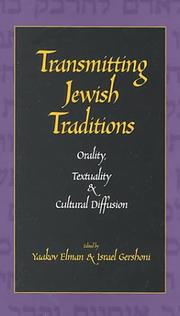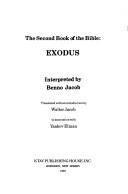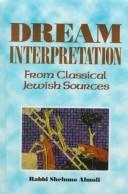| Listing 1 - 8 of 8 |
Sort by
|

ISBN: 0300081987 9780300081985 Year: 2000 Volume: *2 Publisher: New Haven, Conn. Yale University Press
Abstract | Keywords | Export | Availability | Bookmark
 Loading...
Loading...Choose an application
- Reference Manager
- EndNote
- RefWorks (Direct export to RefWorks)
Book
ISBN: 9789004235441 9789004235458 Year: 2012 Volume: 35 Publisher: Leiden Brill
Abstract | Keywords | Export | Availability | Bookmark
 Loading...
Loading...Choose an application
- Reference Manager
- EndNote
- RefWorks (Direct export to RefWorks)
Judaism --- Sassanids --- 296 <082> --- Sasanians --- Sassanians --- Influence. --- Intellectual life. --- Judaïsme. Jodendom--Feestbundels. Festschriften --- Talmud --- Bible. --- Antico Testamento --- Hebrew Bible --- Hebrew Scriptures --- Kitve-ḳodesh --- Miḳra --- Old Testament --- Palaia Diathēkē --- Pentateuch, Prophets, and Hagiographa --- Sean-Tiomna --- Stary Testament --- Tanakh --- Tawrāt --- Torah, Neviʼim, Ketuvim --- Torah, Neviʼim u-Khetuvim --- Velho Testamento --- Talmud Bavli --- Babylonian Talmud --- Talmud, Babylonian --- Talmud Vavilonskiĭ --- Talmoed, Babylonische --- Babylonische Talmoed --- Shas --- Shishah sedarim --- Talmud of Babylonia --- Talmud de Babilonia --- Talmud Babli --- Talmouth --- Talmod --- Criticism, interpretation, etc. --- Iran --- Civilization --- Jewish influences --- Intellectual life --- Festschrift - Libri Amicorum --- Influence --- República Islâmica do Irã --- Irã --- Persia --- Northern Tier --- Islamic Republic of Iran --- Jumhūrī-i Islāmī-i Īrān --- I-lang --- Paras-Iran --- Paras --- Persia-Iran --- I.R.A. --- Islamische Republik Iran --- Islamskai︠a︡ Respublika Iran --- I.R.I. --- IRI --- ايران --- جمهورى اسلامى ايران --- Êran --- Komarî Îslamî Êran

ISBN: 0881250287 9780881250282 Year: 1992 Publisher: Hoboken Ktav
Abstract | Keywords | Export | Availability | Bookmark
 Loading...
Loading...Choose an application
- Reference Manager
- EndNote
- RefWorks (Direct export to RefWorks)
Bible. --- Commentaries. --- 222.3 --- Exodus. Leviticus. Numeri --- Chʻuraegŭpki (Book of the Old Testament) --- Exodus (Book of the Old Testament) --- Khurūj --- Kitāb-i Shimūt (Book of the Old Testament) --- Shemot --- Sifr al-Khurūj (Book of the Old Testament) --- Shemos

ISBN: 0881255335 Year: 1998 Publisher: Hoboken, NJ : KTAV Pub. House,
Abstract | Keywords | Export | Availability | Bookmark
 Loading...
Loading...Choose an application
- Reference Manager
- EndNote
- RefWorks (Direct export to RefWorks)
Dream interpretation in rabbinical literature --- Dreams --- Early works to 1800 --- Religious aspects --- Judaism --- Early works to 1800
Book
ISBN: 1283602164 9786613914613 9004235450 Year: 2012 Publisher: Leiden ; Boston : Brill,
Abstract | Keywords | Export | Availability | Bookmark
 Loading...
Loading...Choose an application
- Reference Manager
- EndNote
- RefWorks (Direct export to RefWorks)
Shoshannat Yaakov honors Yaakov Elman, Professor of Talmud at Yeshiva University, and celebrates Elman’s contributions to a broad range of disciplines within Jewish and Iranian studies. The fruits of Elman’s seminal project of bringing together of scholars of Iranian studies and Talmud in ways that have transformed both disciplines, are well represented in this volume, together with scholarship that ranges from Second Temple Judaism to Late Antique Judaism, Zoroastrianism, Samaritanism and Christianity.
Judaism --- Sassanids --- Influence. --- Intellectual life. --- Talmud --- Bible. --- Criticism, interpretation, etc. --- Iran --- Civilization --- Jewish influences --- Intellectual life
Book

ISBN: 1463210124 Year: 2005 Publisher: Piscataway, NJ : Gorgias Press,
Abstract | Keywords | Export | Availability | Bookmark
 Loading...
Loading...Choose an application
- Reference Manager
- EndNote
- RefWorks (Direct export to RefWorks)
This work consists of a selection of papers from sessions during the first two years of SBL Consultation on Midrash. It demonstrates innovative approaches to midrashic texts and hermeneutic reflections on similarities and differences between interpretations of the Bible.
Book

ISBN: 0674967429 0674736125 9780674736122 9780674052864 0674052862 9780674967427 Year: 2015 Publisher: Cambridge, MA
Abstract | Keywords | Export | Availability | Bookmark
 Loading...
Loading...Choose an application
- Reference Manager
- EndNote
- RefWorks (Direct export to RefWorks)
Philology-the discipline of making sense of texts-is enjoying a renaissance within academia after decades of neglect. World Philology charts the evolution of philology across the many cultures and historical time periods in which it has been practiced, and demonstrates how this branch of knowledge, like philosophy and mathematics, is an essential component of human understanding. Every civilization has developed ways of interpreting the texts that it produces, and differences of philological practice are as instructive as the similarities. We owe our idea of a textual edition for example, to the third-century BCE scholars of the Alexandrian Library. Rabbinical philology created an innovation in hermeneutics by shifting focus from how the Bible commands to what it commands. Philologists in Song China and Tokugawa Japan produced startling insights into the nature of linguistic signs. In the early modern period, new kinds of philology arose in Europe but also among Indian, Chinese, and Japanese commentators, Persian editors, and Ottoman educationalists who began to interpret texts in ways that had little historical precedent. They made judgments about the integrity and consistency of texts, decided how to create critical editions, and determined what it actually means to read. Covering a wide range of cultures-Greek, Roman, Hebrew, Arabic, Sanskrit, Chinese, Indo-Persian, Japanese, Ottoman, and modern European-World Philology lays the groundwork for a new scholarly discipline.
Philology --- History. --- filologi --- historisk framstilling
Book

ISBN: 1618110446 9781618110442 9781934843413 1934843415 Year: 2010 Publisher: Boston, MA
Abstract | Keywords | Export | Availability | Bookmark
 Loading...
Loading...Choose an application
- Reference Manager
- EndNote
- RefWorks (Direct export to RefWorks)
Embarrassment and embracement are two moments in the reading, misreading and re-reading of scriptures, defined broadly to include both canonical and non-canonical texts. Despite what Harold Bloom calls our "belatedness" in this process, every reading community has its way of confronting that moment of embarrassment so as to re-embrace or reject its implications. These implications are especially strong in religious cultures with a nomian tradition. By entering into that very tension between what Fox calls embarrassment and re-embracement, every reader recognizes the anxiety of a narrative's influence upon a community. Papers dealing with different aspects of this phenomenon are part of a festschrift honoring Professor Harry Fox (LeBeit Yoreh) the originator of this seminal idea in the transmission of texts. Contributors include such scholars as Yaakov Elman, Simcha Fishbane, the late Chana Safrai and Tirzah Meacham as well as many students, colleagues and friends of Professor Fox.
Judaism --- Rabbinical literature --- Gentiles in the Old Testament. --- Gentiles in rabbinical literature. --- Jewish ethics. --- Embarrassment. --- Self-consciousness (Sensitivity) --- Ethics, Jewish --- Jews --- Religious ethics --- Relations. --- History and criticism. --- Ethics --- Bible. --- Antico Testamento --- Hebrew Bible --- Hebrew Scriptures --- Kitve-ḳodesh --- Miḳra --- Old Testament --- Palaia Diathēkē --- Pentateuch, Prophets, and Hagiographa --- Sean-Tiomna --- Stary Testament --- Tanakh --- Tawrāt --- Torah, Neviʼim, Ketuvim --- Torah, Neviʼim u-Khetuvim --- Velho Testamento --- Criticism, interpretation, etc., Jewish. --- Criticism, interpretation, etc.
| Listing 1 - 8 of 8 |
Sort by
|

 Search
Search Feedback
Feedback About UniCat
About UniCat  Help
Help News
News